Unit 4 A good read(Comic-readingmainpoints1)课件(共有PPT15张)
文档属性
| 名称 | Unit 4 A good read(Comic-readingmainpoints1)课件(共有PPT15张) |
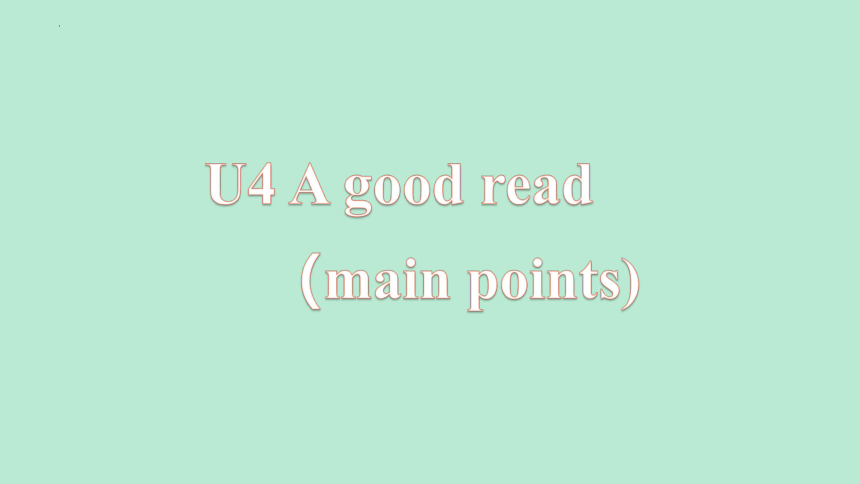
|
|
| 格式 | pptx | ||
| 文件大小 | 103.9KB | ||
| 资源类型 | 教案 | ||
| 版本资源 | 牛津译林版 | ||
| 科目 | 英语 | ||
| 更新时间 | 2022-03-30 00:00:00 | ||
图片预览

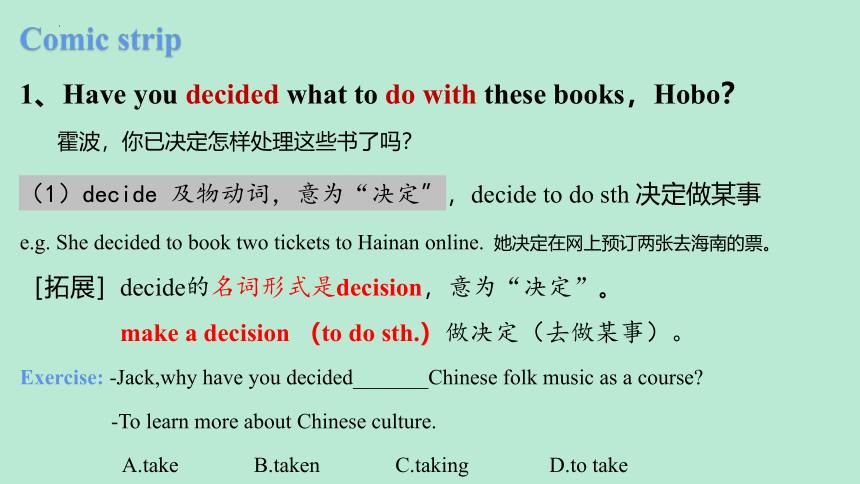
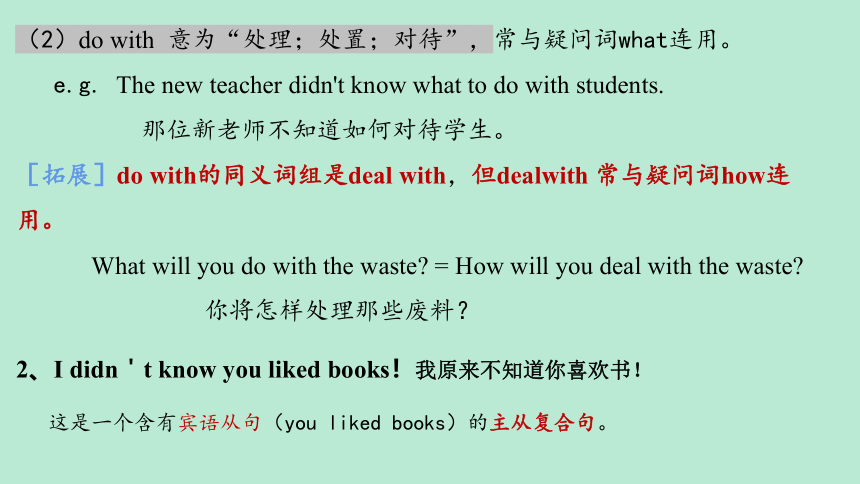
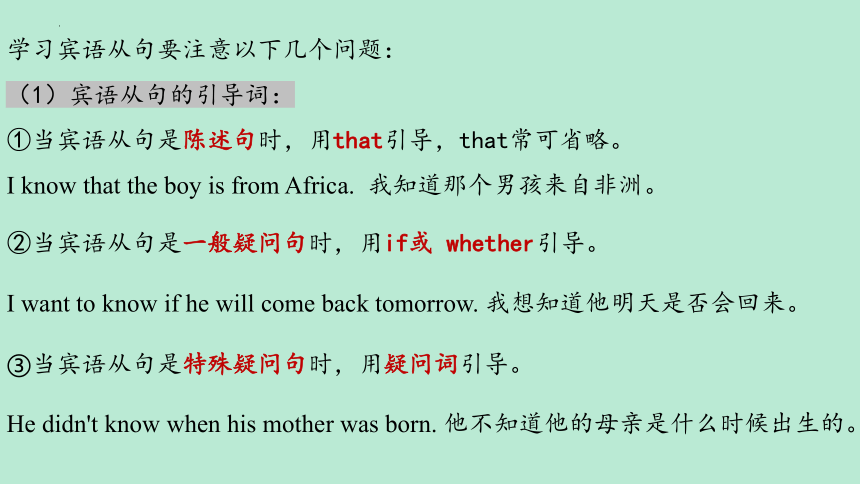
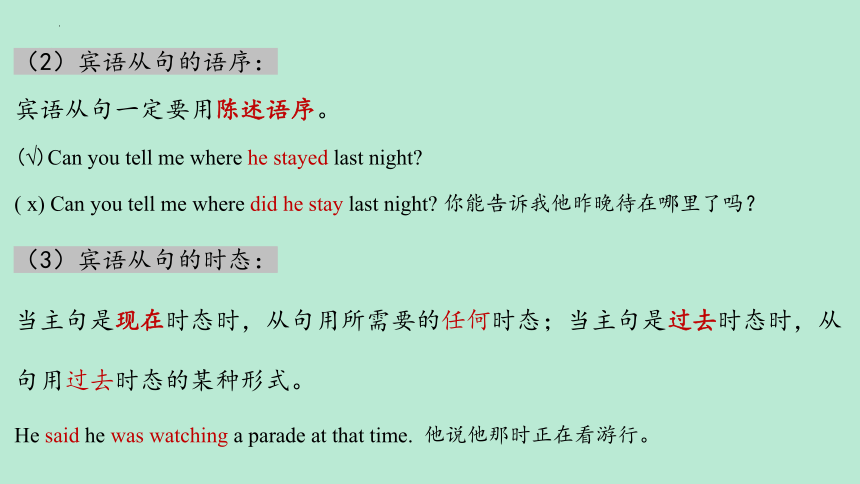
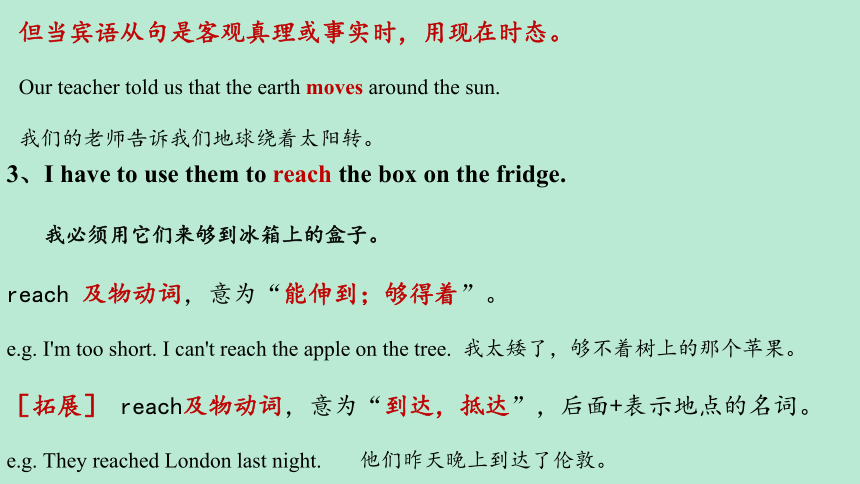

文档简介
(共15张PPT)
U4 A good read
(main points)
Comic strip
1、Have you decided what to do with these books,Hobo?
霍波,你已决定怎样处理这些书了吗?
(1)decide 及物动词,意为“决定”,decide to do sth 决定做某事
e.g. She decided to book two tickets to Hainan online. 她决定在网上预订两张去海南的票。
[拓展]decide的名词形式是decision,意为“决定”。
make a decision (to do sth.)做决定(去做某事)。
Exercise: -Jack,why have you decided_______Chinese folk music as a course
-To learn more about Chinese culture.
A.take B.taken C.taking D.to take
(2)do with 意为“处理;处置;对待”,常与疑问词what连用。
e.g. The new teacher didn't know what to do with students.
那位新老师不知道如何对待学生。
[拓展]do with的同义词组是deal with,但dealwith 常与疑问词how连用。
What will you do with the waste = How will you deal with the waste
你将怎样处理那些废料?
2、I didn't know you liked books!我原来不知道你喜欢书!
这是一个含有宾语从句(you liked books)的主从复合句。
学习宾语从句要注意以下几个问题:
(1)宾语从句的引导词:
①当宾语从句是陈述句时,用that引导,that常可省略。
I know that the boy is from Africa. 我知道那个男孩来自非洲。
②当宾语从句是一般疑问句时,用if或 whether引导。
I want to know if he will come back tomorrow. 我想知道他明天是否会回来。
③当宾语从句是特殊疑问句时,用疑问词引导。
He didn't know when his mother was born. 他不知道他的母亲是什么时候出生的。
(2)宾语从句的语序:
宾语从句一定要用陈述语序。
(√)Can you tell me where he stayed last night
( x) Can you tell me where did he stay last night 你能告诉我他昨晚待在哪里了吗?
(3)宾语从句的时态:
当主句是现在时态时,从句用所需要的任何时态;当主句是过去时态时,从句用过去时态的某种形式。
He said he was watching a parade at that time. 他说他那时正在看游行。
3、I have to use them to reach the box on the fridge.
我必须用它们来够到冰箱上的盒子。
reach 及物动词,意为“能伸到;够得着”。
e.g. I'm too short. I can't reach the apple on the tree. 我太矮了,够不着树上的那个苹果。
[拓展] reach及物动词,意为“到达,抵达”,后面+表示地点的名词。
e.g. They reached London last night. 他们昨天晚上到达了伦敦。
但当宾语从句是客观真理或事实时,用现在时态。
Our teacher told us that the earth moves around the sun.
我们的老师告诉我们地球绕着太阳转。
Welcome to the unit
1、I'm reading a book about Germany in World War II.
我在读一本关于二战中德国的书。
Germany 专有名词,意为“德国”。
e.g. Germany is a European country. 德国是一个欧洲国家。
[拓展]German
1)可数名词,意为“德国人”,复数形式为Germans;
2)不可数名词,意为“德语”;
3)作形容词,意为“德国的,德国人的”。
e.g. Germans speak German.德国人说德语。
2、I’m interested in history books.我对历史书籍感兴趣。
interested,interesting与interest
interested 形容词,“感兴趣的,表现出兴趣的” 人对物感兴趣,人的感受,作表语。
be interested in....对.....感兴趣
interesting 形容词,“有趣的,有吸引力的” 某物本身具有令人感兴趣的特征
常说明物
interest 名词,“兴趣,爱好” have/take (an) interest in....=be interested in
“对.....感兴趣”
动词,“使感兴趣,使关注” 常用事或物做主语,宾语常为人。
3、They improve my knowledge of the past.它们增长我的历史知识。
knowledge 不可数名词,意为吧v官方“知识,学识;理解,认识”。
e.g. Knowledge is power.知识就是力量。
4.What do you like to read in your spare time?在空闲时你喜欢读什么?
spare 形容词“空闲的;空余的;多余的”,
in one's spare time “在某人的空闲时间”= in one's free time
e.g. I often listen to music in my spare/free time. 在空闲时间我经常听音乐。
5. The Hunchback of Notre Dame by the French writer Victor Hugo is great. 法国作家维克多·雨果的《巴黎圣母院》很棒.
French 形容词“法国的,法国人的”。
[拓展]
①French作不可数名词,意为“法语”。
e.g.The guide can speak French. 那位导游会讲法语。
②Frenchman可数名词,“法国人,法国男人”,复数形式为Frenchmen;
Frenchwoman 可数名词,意为“法国女人”,复数形式为French-women。
③France名词,意为“法国”。
e.g. Mr Brown has never been to France. 布朗先生从没去过法国。
6. The story of the ugly man Quasimodo really touched me.
丑男人卡西莫多的故事确实感动了我。
touch 及物动词“感动,触动”,在语气上比move要弱一些。
e.g.The brave mother touched everyone.那位勇敢的母亲感动了每个人。
1. After our ship crashed against the rocks, I swam as far as I could.
在我们的船撞到礁石损坏之后,我奋力前游。
(1)crash 不及物动词,意为“猛撞,碰撞”。
e.g. The car crashed into the tree. 那辆车撞到了树上。
[拓展]crash还可作名词,意为“碰撞;碰撞声”。
e.g. There was a serious car crash this moming. 今天早上发生了一起严重的撞车事
(2)against 介词,意为“紧靠,碰,撞,反对”。
e.g. There's a ladder against the wall., 有一把梯子靠在墙上。
against the wall靠在墙上 hit against a tree 撞到树上 against the war反对战争
Story Time
(3)as...as one can/could“尽某人所能...” =as...as possible。
Please come as early as you can=Please come as early as possible.
请尽量早点儿来。
2. By the time I finally felt the land under my feet, was tired out.
等到我终于感觉到脚下的陆地时,我已筋疲力尽。
(1)by the time“(时间)在...之前,不迟于...”,引导时间状语从句。
e.g. By the time I came in, Tom had written his name on the blackboard.
在我进来之前,汤姆已经把他的名字写在黑板上了。
(2)be tired out“筋疲力尽”
e.g. I was tired out when I got to the top ofthe mountain. 到达山顶时,我感到筋疲力尽。
[拓展]be tired of 意为“对...感到厌烦,厌倦”
e.g.Kitty was tired of eating seafood.基蒂厌倦了吃海鲜。
3. I woke up as the sun was rising...当太阳升起时 我醒了过来...
(1)wake up 意为“醒来”,表示自行醒来,后面不加宾语;
意为“把...叫醒”时,后接宾语,若宾语为人称代词,则要放在wake和up中间。
e.g. Would you mind waking me up earlier tomorrow morning?你介意明天早晨早点儿叫醒我吗?
(2)辨析:as,when与while
三者都可用作连词,意为“当...的时候”,引导时间状语从句,但用法不同。
as:引导的从句中谓语动词可以是延续性动词,也可以是非延续性动词,当主从句所述动作同时发生时,意为“一边...一边...”
e.g. As he looked, a man came near. 正当他看的时候,一名男子走上前来。
when:引导的从句中谓语动词可以是延续性动词,也可以是非延续性动词,主从句所述动作可同时发生,也可先后发生。
e.g. I went to bed when I finished my homework. 做完作业,我就去睡觉了。
while:引导的从句中谓语动词必须是延续性动词,多表示主从句动作同时发生,也可表示对比.
e.g. Please write while I read.我读的时候你请写一写。
(3)rise(rose,risen,rising)不及物动词,“升 起,上升”。
e.g. The sun rises in the east and sets in the west. 太阳东升西落。
[拓展]rise by“上升了....”,rise to“上升到....”
e.g. The water in the river has risen by one meter after the rain.雨后河里的水涨了1米。
The price of the oil there rose to seven yuan per li-tre.那里的油价上升到了每升7元。
辨析:rise与raise
rise 不及物动词 “上升”,指人或事物自身不借助外力起来、升高 The temperature is
rising.
温度在升高。
raise 及物动词 “上升,举起”,指人为地让物体升高 He raised his hand
and then put down.
他把手举起来然
后又放下了。
4. My arms, legs and hair were tied to the ground!
我的胳膊、腿和头发被拴在了地上!
tie 及物动词,“捆,绑,系,打结”.现在分词为tying。tie...to...“把...系/拴到..上”。
e.g. Please tie the tree to the stick to keep it straight. 请把树绑到木棍上,使树直立。
[拓展]tie可作可数名词,意为“领带”。
e.g. He is wearing a blue tie.他打着一条蓝领带。
U4 A good read
(main points)
Comic strip
1、Have you decided what to do with these books,Hobo?
霍波,你已决定怎样处理这些书了吗?
(1)decide 及物动词,意为“决定”,decide to do sth 决定做某事
e.g. She decided to book two tickets to Hainan online. 她决定在网上预订两张去海南的票。
[拓展]decide的名词形式是decision,意为“决定”。
make a decision (to do sth.)做决定(去做某事)。
Exercise: -Jack,why have you decided_______Chinese folk music as a course
-To learn more about Chinese culture.
A.take B.taken C.taking D.to take
(2)do with 意为“处理;处置;对待”,常与疑问词what连用。
e.g. The new teacher didn't know what to do with students.
那位新老师不知道如何对待学生。
[拓展]do with的同义词组是deal with,但dealwith 常与疑问词how连用。
What will you do with the waste = How will you deal with the waste
你将怎样处理那些废料?
2、I didn't know you liked books!我原来不知道你喜欢书!
这是一个含有宾语从句(you liked books)的主从复合句。
学习宾语从句要注意以下几个问题:
(1)宾语从句的引导词:
①当宾语从句是陈述句时,用that引导,that常可省略。
I know that the boy is from Africa. 我知道那个男孩来自非洲。
②当宾语从句是一般疑问句时,用if或 whether引导。
I want to know if he will come back tomorrow. 我想知道他明天是否会回来。
③当宾语从句是特殊疑问句时,用疑问词引导。
He didn't know when his mother was born. 他不知道他的母亲是什么时候出生的。
(2)宾语从句的语序:
宾语从句一定要用陈述语序。
(√)Can you tell me where he stayed last night
( x) Can you tell me where did he stay last night 你能告诉我他昨晚待在哪里了吗?
(3)宾语从句的时态:
当主句是现在时态时,从句用所需要的任何时态;当主句是过去时态时,从句用过去时态的某种形式。
He said he was watching a parade at that time. 他说他那时正在看游行。
3、I have to use them to reach the box on the fridge.
我必须用它们来够到冰箱上的盒子。
reach 及物动词,意为“能伸到;够得着”。
e.g. I'm too short. I can't reach the apple on the tree. 我太矮了,够不着树上的那个苹果。
[拓展] reach及物动词,意为“到达,抵达”,后面+表示地点的名词。
e.g. They reached London last night. 他们昨天晚上到达了伦敦。
但当宾语从句是客观真理或事实时,用现在时态。
Our teacher told us that the earth moves around the sun.
我们的老师告诉我们地球绕着太阳转。
Welcome to the unit
1、I'm reading a book about Germany in World War II.
我在读一本关于二战中德国的书。
Germany 专有名词,意为“德国”。
e.g. Germany is a European country. 德国是一个欧洲国家。
[拓展]German
1)可数名词,意为“德国人”,复数形式为Germans;
2)不可数名词,意为“德语”;
3)作形容词,意为“德国的,德国人的”。
e.g. Germans speak German.德国人说德语。
2、I’m interested in history books.我对历史书籍感兴趣。
interested,interesting与interest
interested 形容词,“感兴趣的,表现出兴趣的” 人对物感兴趣,人的感受,作表语。
be interested in....对.....感兴趣
interesting 形容词,“有趣的,有吸引力的” 某物本身具有令人感兴趣的特征
常说明物
interest 名词,“兴趣,爱好” have/take (an) interest in....=be interested in
“对.....感兴趣”
动词,“使感兴趣,使关注” 常用事或物做主语,宾语常为人。
3、They improve my knowledge of the past.它们增长我的历史知识。
knowledge 不可数名词,意为吧v官方“知识,学识;理解,认识”。
e.g. Knowledge is power.知识就是力量。
4.What do you like to read in your spare time?在空闲时你喜欢读什么?
spare 形容词“空闲的;空余的;多余的”,
in one's spare time “在某人的空闲时间”= in one's free time
e.g. I often listen to music in my spare/free time. 在空闲时间我经常听音乐。
5. The Hunchback of Notre Dame by the French writer Victor Hugo is great. 法国作家维克多·雨果的《巴黎圣母院》很棒.
French 形容词“法国的,法国人的”。
[拓展]
①French作不可数名词,意为“法语”。
e.g.The guide can speak French. 那位导游会讲法语。
②Frenchman可数名词,“法国人,法国男人”,复数形式为Frenchmen;
Frenchwoman 可数名词,意为“法国女人”,复数形式为French-women。
③France名词,意为“法国”。
e.g. Mr Brown has never been to France. 布朗先生从没去过法国。
6. The story of the ugly man Quasimodo really touched me.
丑男人卡西莫多的故事确实感动了我。
touch 及物动词“感动,触动”,在语气上比move要弱一些。
e.g.The brave mother touched everyone.那位勇敢的母亲感动了每个人。
1. After our ship crashed against the rocks, I swam as far as I could.
在我们的船撞到礁石损坏之后,我奋力前游。
(1)crash 不及物动词,意为“猛撞,碰撞”。
e.g. The car crashed into the tree. 那辆车撞到了树上。
[拓展]crash还可作名词,意为“碰撞;碰撞声”。
e.g. There was a serious car crash this moming. 今天早上发生了一起严重的撞车事
(2)against 介词,意为“紧靠,碰,撞,反对”。
e.g. There's a ladder against the wall., 有一把梯子靠在墙上。
against the wall靠在墙上 hit against a tree 撞到树上 against the war反对战争
Story Time
(3)as...as one can/could“尽某人所能...” =as...as possible。
Please come as early as you can=Please come as early as possible.
请尽量早点儿来。
2. By the time I finally felt the land under my feet, was tired out.
等到我终于感觉到脚下的陆地时,我已筋疲力尽。
(1)by the time“(时间)在...之前,不迟于...”,引导时间状语从句。
e.g. By the time I came in, Tom had written his name on the blackboard.
在我进来之前,汤姆已经把他的名字写在黑板上了。
(2)be tired out“筋疲力尽”
e.g. I was tired out when I got to the top ofthe mountain. 到达山顶时,我感到筋疲力尽。
[拓展]be tired of 意为“对...感到厌烦,厌倦”
e.g.Kitty was tired of eating seafood.基蒂厌倦了吃海鲜。
3. I woke up as the sun was rising...当太阳升起时 我醒了过来...
(1)wake up 意为“醒来”,表示自行醒来,后面不加宾语;
意为“把...叫醒”时,后接宾语,若宾语为人称代词,则要放在wake和up中间。
e.g. Would you mind waking me up earlier tomorrow morning?你介意明天早晨早点儿叫醒我吗?
(2)辨析:as,when与while
三者都可用作连词,意为“当...的时候”,引导时间状语从句,但用法不同。
as:引导的从句中谓语动词可以是延续性动词,也可以是非延续性动词,当主从句所述动作同时发生时,意为“一边...一边...”
e.g. As he looked, a man came near. 正当他看的时候,一名男子走上前来。
when:引导的从句中谓语动词可以是延续性动词,也可以是非延续性动词,主从句所述动作可同时发生,也可先后发生。
e.g. I went to bed when I finished my homework. 做完作业,我就去睡觉了。
while:引导的从句中谓语动词必须是延续性动词,多表示主从句动作同时发生,也可表示对比.
e.g. Please write while I read.我读的时候你请写一写。
(3)rise(rose,risen,rising)不及物动词,“升 起,上升”。
e.g. The sun rises in the east and sets in the west. 太阳东升西落。
[拓展]rise by“上升了....”,rise to“上升到....”
e.g. The water in the river has risen by one meter after the rain.雨后河里的水涨了1米。
The price of the oil there rose to seven yuan per li-tre.那里的油价上升到了每升7元。
辨析:rise与raise
rise 不及物动词 “上升”,指人或事物自身不借助外力起来、升高 The temperature is
rising.
温度在升高。
raise 及物动词 “上升,举起”,指人为地让物体升高 He raised his hand
and then put down.
他把手举起来然
后又放下了。
4. My arms, legs and hair were tied to the ground!
我的胳膊、腿和头发被拴在了地上!
tie 及物动词,“捆,绑,系,打结”.现在分词为tying。tie...to...“把...系/拴到..上”。
e.g. Please tie the tree to the stick to keep it straight. 请把树绑到木棍上,使树直立。
[拓展]tie可作可数名词,意为“领带”。
e.g. He is wearing a blue tie.他打着一条蓝领带。
